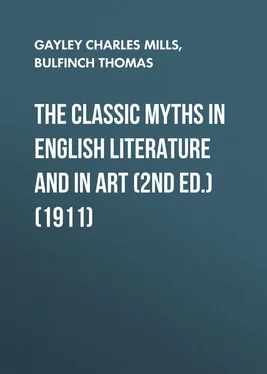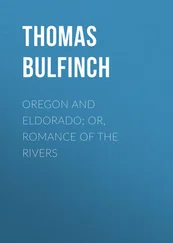The names included in parentheses represent the Greek, the others being Roman equivalents, Latin names, or names common to both Greek and Roman usage.
See Commentary, § 34.
On the Latin name, see Commentary, § 24.
Iliad, I, 622-625, Earl of Derby's translation. See also the passage in Chapman's translation.
On the name Juno , see Commentary.
For the names Athene and Minerva , see Commentary.
See Commentary.
Iliad, 5, 590. See also 21, 395.
Iliad, 18, 395.
Iliad, 1, 390.
On the birth of Apollo, his adventures, names, festivals, oracles, and his place in literature and art, see Commentary. For other particulars, see sections on Myths of Apollo .
From Cynthia's Revels.
Iliad, 5, 370, etc.
A popular etymology.
For Venus in poetry and art, see Commentary.
From the Venus of Milo, by E. R. Sill, formerly professor of English Literature in the University of California.
The references are to the Berkeley Hills, the Bay of San Francisco, and the glimpses of the Pacific.
Lang, Odyssey, 24, 1; adapted.
Eros, by Edmund Gosse. For verses on the blindness of Cupid, see Lyly's Cupid and Campaspe in Commentary.
For description of their spinning, see translation of Catullus, LXIV, in § 191.
See Commentary.
For references to poetry and works of art, see corresponding sections in Commentary.
According to Thomas Moore's Song of a Hyperborean.
From Alexander's Feast.
For interpretation and illustration, see corresponding sections of Commentary.
Iliad, 22, 482; 9, 568; 20, 61.
Odyssey, 10, 508; 11, 20; 24, 1.
Sophocles, Œdipus Rex, 177.
Æneid, 6, 295.
From The Garden of Proserpine, by A. C. Swinburne.
Æneid, 6.
Odyssey, 4, 561.
Hes. Works and Days, 169.
From The Fortunate Islands, by Andrew Lang.
Iliad, 14, 231; 16, 672.
Odyssey, 24, 12; 19, 560. Æneid, 6, 893. Ovid, Metam. 11, 592.
For genealogical table, see Commentary.
For references to poetry and works of art, see corresponding sections of Commentary.
Iliad, 14, 303.
Iliad, 18, 30-50.
For genealogical table, see Commentary.
Wordsworth, Miscellaneous Sonnets.
Names of the corresponding Greek divinities are in parentheses.
For illustrative material, see Commentary.
Gellius, 5, 12. Ovid, Fasti, 1, 179. Macrobius, Sat. 1, 9-15.
From Macaulay's Prophecy of Capys.
Ovid, Metam. I, 700 et seq.
Ovid, Metam. 2, 410 et seq.
Translated by Andrew Lang: Theocritus, Bion, and Moschus, London, 1880.
§ 70.
Ovid, Metam. 3, 260 et seq.
§§ 42, 110-113.
From E. R. Sill's Semele.
Commentary, §§ 118, 255.
Ovid, Metam. 7, 172 et seq.
Roscher, Ausf. Lex. Lfg. 3, 379 [Schirmer]. Originals in Pausanias, Apollodorus, and Hyginus.
From Tennyson's Amphion. See Horace, Ars Poet. 394.
Ovid, Metam. 8, 620-724.
From The Sons of Cydippe, by Edmund Gosse in his On Viol and Flute.
§ 27, and Commentary.
From Ovid.
From Spenser's Muiopotmos.
Ovid, Metam. 6, 1-145.
§ 200.
Iliad, 5, 850 et seq. (Lang, Leaf, and Myers' translation). In accordance with the system of nomenclature adopted in this work, Latin equivalents are given, wherever possible, for Greek names.
Iliad, 21, 390 (Lang, Leaf, and Myers' translation).
Ovid, Metam. 3, 1-137; 4, 563-614.
Iliad, 2, 1335.
Ovid, Metam. 6, 313-381.
§ 30.
Roscher, Ausf. Lex. Lfg. 2, 254, Article Aloadæ [Schultz].
Ovid, Metam. 10, 162-219.
Ovid, Metam. 2, 1-400.
§ 44.
Medio tutissimus ibis. – Ovid.
Hic situs est Phaëthon, currus auriga paterni,
Quem si non tenuit, magnis tamen excidit ausis. – Ovid.
Iliad, 1, 43-52 (Lang, Leaf, and Myers' translation).
Ovid, Metam. 6, 165-312.
From W. S. Landor's Niobe.
See Commentary, §§ 64, 80.
Iliad, 18, 564 (Lang, Leaf, and Myers' translation).
Cicero, Natura Deorum, 3, 22.
See Commentary.
From Browning's Balaustion's Adventure. The Greek form of the proper names has been retained.
Proserpine.
For the originals, see Iliad, 2, 715, and the Alcestis of Euripides.
Ovid, Metam. 11, 146-193.
§ 118.
§ 145.
Ovid, Metam. 1, 452-567.
From the Fable for Critics.
Iliad, 9, 561; Apollodorus, 1, 7, § 8.
Stephen Phillips, Marpessa.
Ovid, Metam. 4, 256-270.
§ 196.
Читать дальше












